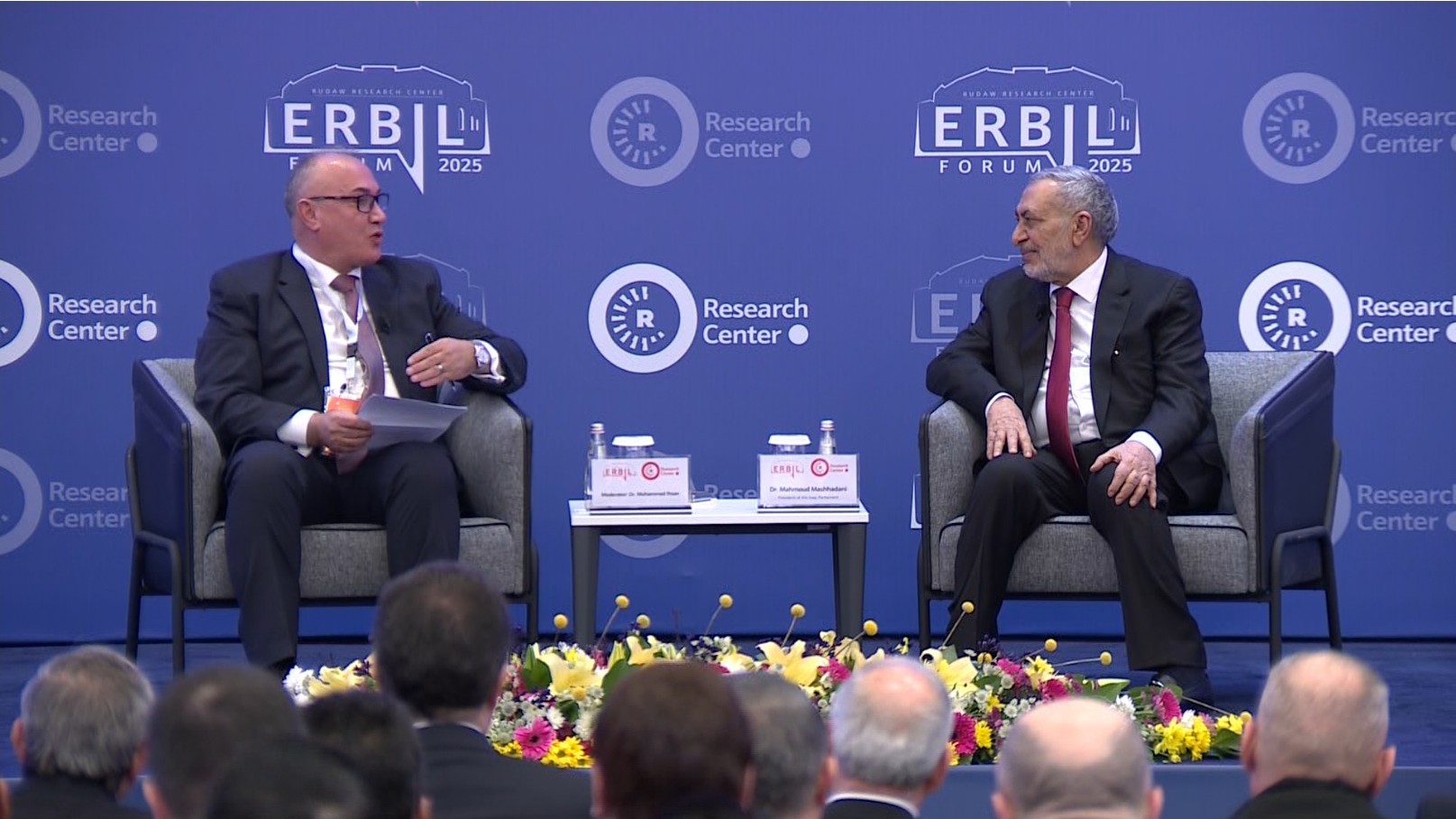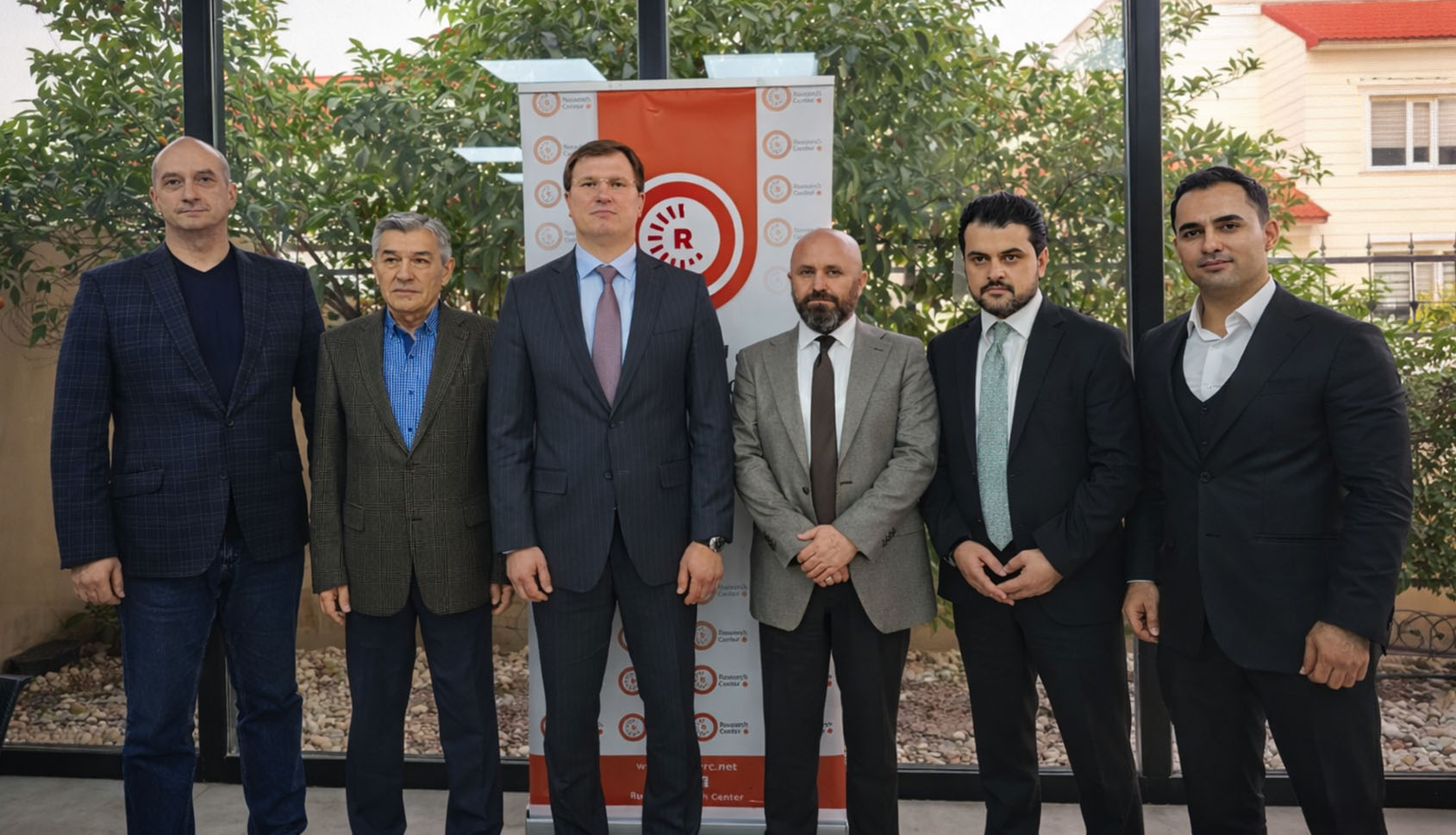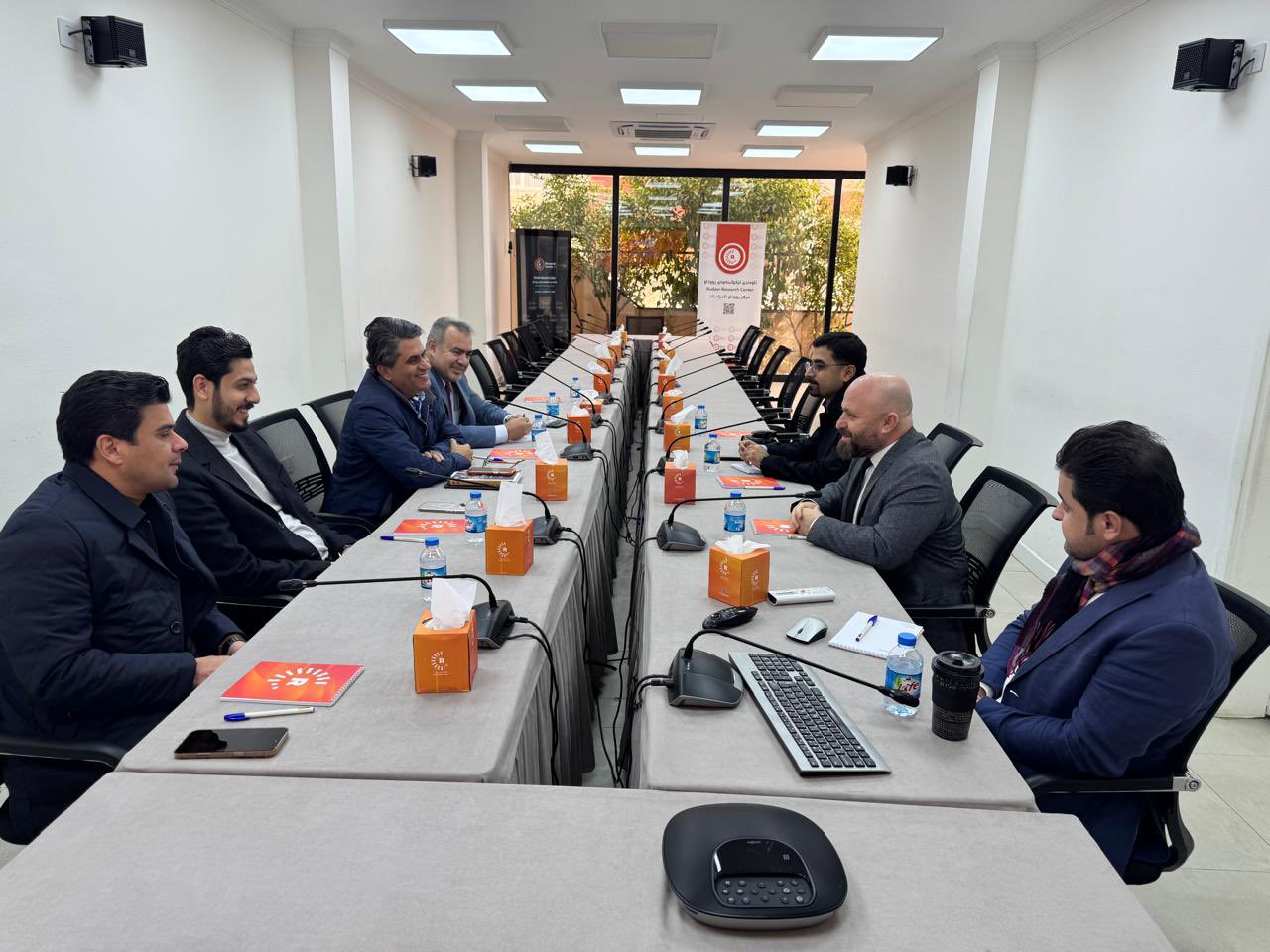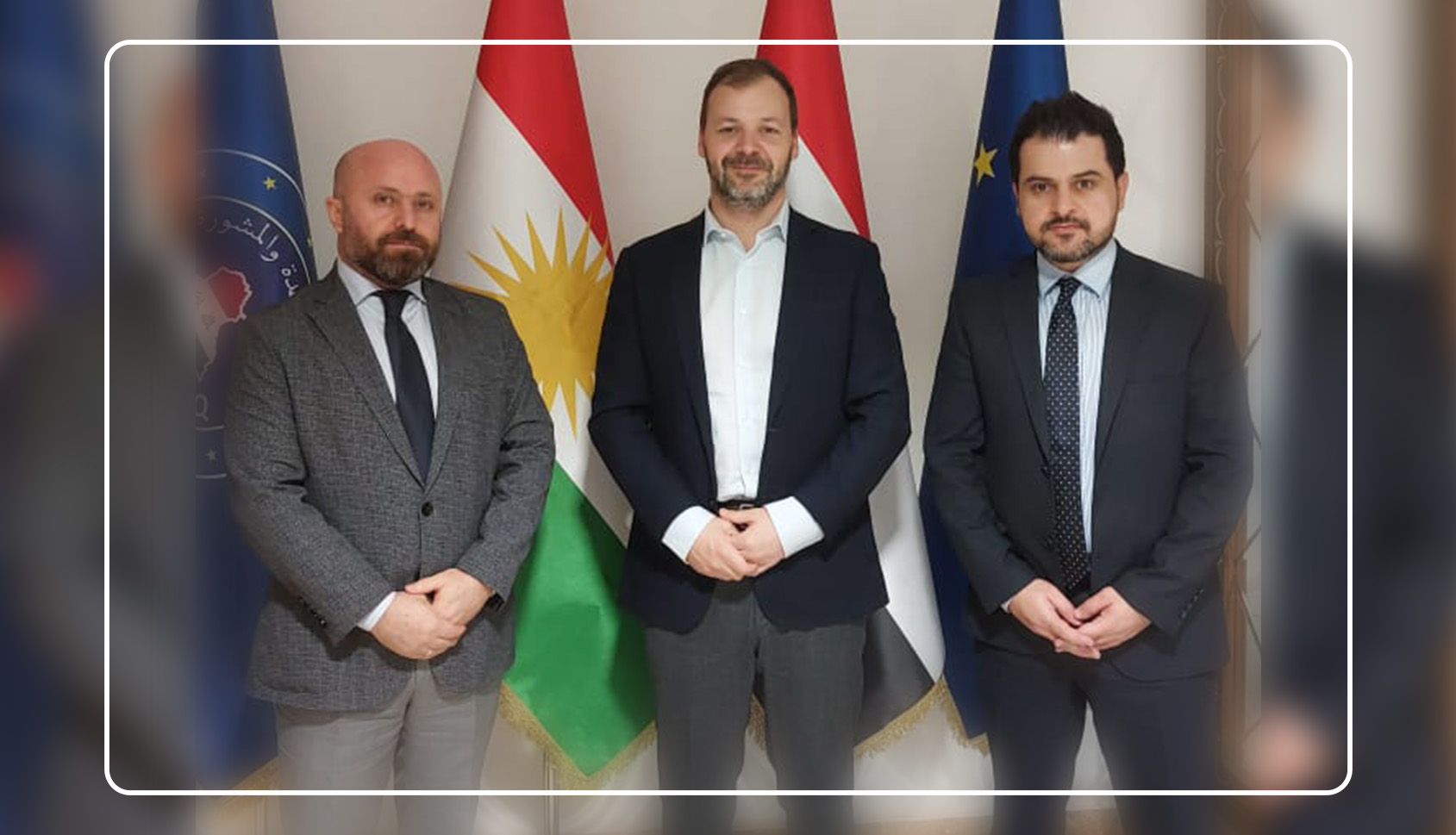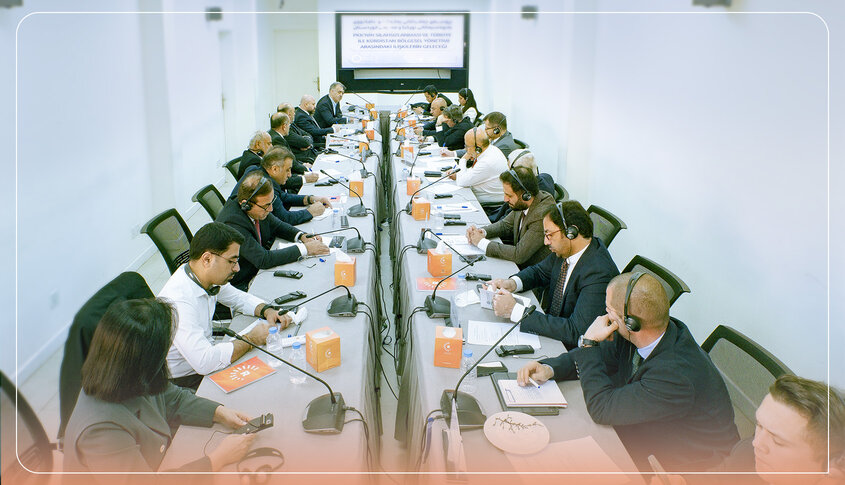Interview 01: The Future of Iraq in Light of the 2025 Elections and Regional Tensions
08-04-2025
Dr. Mohammed Ihsan: I warmly welcome you, Dr. Mahmoud.
Dear audience, we are pleased to welcome you. In this session, we will discuss the future of Iraq in light of the ongoing changes, focusing on the upcoming 2025 elections and the regional tensions that may impact the Iraqi landscape, either negatively or positively.
We are proud to have with us today a political figure known for his clear, honest, and straightforward vision. A man who boldly expresses his ideas without hesitation. I believe he is one of the bravest Sunni politicians, unafraid to clearly and unwaveringly share his views and positions.
This distinguished individual is Dr. Mahmoud Mashhadani, Speaker of the Iraqi Parliament, a doctor who left the medical profession to enter politics during one of Iraq's most delicate periods following 2003.
Dr. Mashhadani is known for his honest positions on crucial issues, primarily concerning Iraq and, more broadly, the region. He does not tend to use diplomatic language but prefers to address events directly. Every interview with Dr. Mashhadani is a moment of both internal and external significance.
Between 2006 and 2008, he served as Speaker of the Iraqi Parliament during a particularly turbulent period in Iraq. I will keep the introduction brief to avoid taking up more of your time.
At Rudaw, we are committed to giving you more time and opportunities, not just for a speech, although you have the right to be the first speaker to express your views in a clear and accurate way.
The first topic, Dr., is the future of Iraq in light of the current challenges. As you know, the region is undergoing profound changes and upheavals. How do you see Iraq's political course in the context of domestic and regional changes? I have three questions on this topic, and I will give you the opportunity to answer them frankly:
- What are the most significant challenges facing the stability of the Iraqi state today, and how can they be overcome?
- We face many challenges. Are we, particularly in Parliament and the government, responsible for confronting these challenges?
- What are the most important reforms the Iraqi Constitution needs to ensure political and social stability in the country?
Dr. Mahmoud Mashhadani:
In the name of Allah, the Most Gracious, the Most Merciful.
Dear President, President of Iraq. Dear brother, the President of the Kurdistan Region. Dear brothers and sisters in all positions. Peace be upon you.
It is a broad question, but I will summarize it as follows: Iraq's fundamental problem today is that it has not yet recovered from the effects of the events that took place in 2003 during the U.S. occupation of Iraq. As our late uncle, Mam Jalal, once told us in a meeting—a lesson we still feel the need for these days—the agreement was to overthrow the regime and hand over the state to the opposition in order to establish a proper democracy. What actually happened, however, was that both the state and the regime were destroyed?
The invader issued a fatwa similar to one of the sheikhs when he was asked how to remove the head of a cow that had fallen into a pot. He said, "Cut off the head of the cow." They did so, but the head remained in the pot. Then, he said, "Break the pot."
After that, the work was handed over to the opposition.
Dr. Mohammed Ehsan:
You were also in the opposition.
Dr. Mahmoud Mashhadani:
Yes, I was released from prison before the occupation.
Dr. Mohammed Ehsan:
Released from prison for political reasons?
Dr. Mahmoud Mashhadani:
Yes, I was imprisoned by the previous regime, the Americans, and another party that I don't wish to name.
What is this problem? The issue is that the state, the army, and everything else was completely overthrown.
Dr. Mohammed Ehsan:
I am talking about the current changes and the history we all know.
Dr. Mahmoud Mashhadani:
Yes, let’s look at what it is now. Now...
Dr. Mohammed Ehsan:
Where is the situation going with regional and international challenges? Are we living in a very dangerous period?
Dr. Mahmoud Mashhadani:
That's right. This is an explanation for the brothers present as to why we are delayed in development. We lagged behind because we inherited an occupied and devastated state—a state that took 80 years to build, but was demolished in an instant and handed over to us. In 2003, we began the process of rebuilding it. We started with the constitution, which was very good. More than 95% of it was excellent, although there are some notes here and there.
Now, after the overthrow of the state, we are not left alone, and we are not allowed to rebuild Iraq. Instead, the door to hell has been opened to us.
Baghdad sometimes witnessed 20 or 30 explosions. What capital in the world can withstand such planned and organized terrorism from all its neighbors, both near and far? We do not mean any particular neighbor. It wasn’t until we had a break in 2010, which lasted for a year or a year and a half, that the epidemic of terrorism and ISIS began. This opened another door to hell for us, ending with the fall of all the western regions. Then, we began the process of liberation from this occupation until we ended it—how long ago? Two years.
Over the past two years, we have strived to paint a bright picture of this beautiful, multi-religious, and multi-colored Iraq, based on the belief that stable security requires a developed economy, and a developed economy requires stability. We have faced many problems, but now, I believe Iraq is truly stable in terms of security, is becoming economically stable, and has taken a neutral approach to the events surrounding it in order to rebuild itself. We are now building a prosperous Iraq that will return to the region as it once did, playing a major role. This will allow us to open the doors to global investment in this country, enabling us to rebuild the new foundation of the new Iraq.
Iraq, as a state, has 1,432 areas that can be invested in, ranging from energy to other sectors. Our richest province is Anbar. All our future potential, all our treasury, and our future economy depend on what lies underground, alongside the growth of agriculture and industry that were once halted. Samawa is the second richest province in Iraq.
Dr. Mohammed Ehsan: Because there are three cement factories.
Dr. Mahmoud Mashhadani: There are over four hundred materials underground. Iraq, as an energy treasure, is crucial to the world. The United States, Europe, and others insist on stability in order to take advantage of this energy.
Therefore, what is happening around Iraq poses no threat to the country.
Dr. Mohammed Ehsan: Do you think these existing capabilities and expertise have been properly utilized by the government? Today, the largest Iraqi diaspora is abroad. The best Iraqi minds are outside Iraq, not inside the country. Where are they? Have we benefited from them?
Dr. Mahmoud Mashhadani: You know what happened with the skilled workforce. The main principle is that the state needs skilled individuals to build itself, and political parties need loyalty to continue governing. Is that correct?
Dr. Mohammed Ehsan: That's right.
Dr. Mahmoud Mashhadani: If the equation between entrustment and competence continues, with entrustment prevailing over competence, then state-building will be delayed for centuries, and this state may never be formed at all. Especially since entrustment is linked to administrative, political, and financial corruption. Now, we have started, and the main point is that when we select a person for any position, from General Manager upwards in important roles, they should come from the same office, have a solid track record, and possess verifiable skills. This means we are aware that state-building requires these skills, and we must include them. We must also open the way for all the skilled individuals who have migrated to return to Iraq.
Dr. Mohammed Ehsan: Doctor, today the issue of corruption is one of the most sensitive issues in this country. How can parliamentary oversight of government functioning be strengthened to ensure transparency and accountability during your term, or the period you serve as Speaker of the House of Representatives? Will there be new laws in this regard, or not?
Dr. Mahmoud Mashhadani: Unfortunately, corruption has become a social phenomenon over time, especially during the security collapse. With Mr. Sudani's government, this social phenomenon has started to decline. In parliament, we—myself included—see this as a small explanation. This current parliamentary session is the worst one. The first year was spent in conflict between the Tayyar and Itar. The second year saw conflict in Anbar, and in Anbar, between certain factions. The third year was spent working until we finally elected the Speaker of Parliament, and this year is an election year.
However, I insist on activating three committees: the Legal Committee to continue working on the laws, the Integrity Committee to address aspects of corruption, and I have requested a detailed report, which will reach me in full detail. Additionally, I urge the activation of the Finance Committee, as it is very important to us. Let us spread the spirit of citizenship, brotherhood, and love, to avoid bias and self-interest within the framework of sectarianism and racism, and work in the spirit of law, which is the best solution.
As the Prime Minister pointed out, when the political crisis between Baghdad and Erbil, or between the federal government and the Kurdistan Regional Government, becomes a legal issue, it will be easier to resolve. However, if it remains within the political framework, you have seen the problems that arise.
We represent the citizens in the Iraqi parliament. Parliament is still a single chamber, and the second chamber, the Federal Council, which represents the country, has not yet been established. Had the Federal Council been in place, we could have avoided many problems, but unfortunately, it has been delayed.
When parliament represents the citizens, we defend every Iraqi citizen across Iraq. Therefore, our position was not to turn the salaries of our brothers in Kurdistan into a political conflict. They are Iraqi citizens who should receive their salaries without hesitation. If there are problems between the two governments, they will be resolved, as we have a constitution and laws.
Dr. Mohammed Ehsan: The latest statistics and census results have proven that the population of Kurdistan is 15%, contrary to previous claims made in Baghdad, except for the disputed areas. You and I have worked on this file, and I hope you will emphasize this point. These debates about statistics are important; there are three Kurdish provinces, and their population constitutes 15% of Iraq’s total population, excluding the disputed areas. This should be considered in the next budget and in future discussions.
Dr. Mahmoud Mashhadani: The census was very delayed. Now that it has been conducted, it has become law and cannot be violated.
Dr. Mohammed Ehsan: I would like to shift focus away from parliament and its issues to hear your vision for the future of the region. The region is undergoing dramatic changes, and Iraq will certainly be part of these changes. I don’t believe Iraq is immune to the current upheavals. Do you think this conflict, if not resolved in an orderly manner between the communities and the administration of the state, will complicate the political landscape in Iraq? But I would like you to answer this question as Dr. Mashhadani, not as the Speaker of Parliament.
Dr. Mahmoud Mashhadani: Could you please repeat the question?
Dr. Mohammed Ehsan: I’m referring to the changes in the region. Are you asking me to repeat the question so you can understand it better, or so you can think about it, or do you want me to answer frankly? Is it possible for change to occur within the political system without conflict and without jeopardizing the country’s stability? There are many changes in the region—what is your opinion, Dr. Mashhadani?
Dr. Mahmoud Mashhadani: Far from change. Iraq is a democratic system, and I find this strange. There are democratic mechanisms in place. All it takes is to implement democratic processes free from electoral fraud and corruption. We have no choice but to be stable. Since we have a democratic system, the competition should be the peaceful transfer of power, and those who have the right can receive it through elections. If we adhere to this, we will remain stable, but what is happening around us is something else.
We have already overcome the coronavirus and emerged stronger. Iraq is like someone who was infected with the virus. Those who survived have developed strong immunity, and those who did not, unfortunately, did not make it. Their coronavirus has now begun. We passed through this in 2003, and, God willing, we will overcome it again. God willing, Iraq will remain stable as a voluntary federal democracy. I emphasize the word "voluntary." This is a very important point that some of our brothers do not understand. Our federal system is voluntary in the sense that we have chosen to be together, and no one forced us. If I forced you to stay with me, you would still be upset and would try to free yourself from this compulsion as much as possible. However, this is a choice, and it is a desired one. We must build it together. When I visit Erbil and see progress, I am happy because this is my home, this is my country, and it is part of Iraq. And when I visit Basra, Karbala, Anbar, and so on, I feel the same way.
Now, Iraq is stable and will continue to grow more stable. It will grow economically because security is stable, and it is a treasure trove of energy. We must make the best use of this energy for future generations. We are also now focusing on agricultural and industrial development.
Dr. Mohammed Ihsan:
Do you think the government is ready to utilize all available resources and capacities and use Iraqi resources effectively? Or will we revert to the division system, corruption, and the same old problems we have faced since 2003?
Dr. Mahmoud Mashhadani:
I think health is hierarchical. Recovery is happening step by step. Our security stability began two years ago. We need more time to stabilize and grow economically. I believe the future depends on the upcoming elections. If we can maintain peace and stability, and continue progressing towards attracting capabilities and skills, as well as focusing on agricultural and industrial development, I think this is the right course. Any future government should put this on its agenda.
Dr. Mohammed Ihsan:
Do you think the political scene will change in the next elections, or will we remain in the same turmoil with the new law, or the same law we are applying now?
Dr. Mahmoud Mashhadani:
First, the new law has not yet been implemented. The new law has not been introduced to us.
Dr. Mohammed Ehsan: But it is being discussed behind the scenes.
Dr. Mahmoud Mashhadani: It’s true that there are behind-the-scenes discussions, but those behind the scenes still have differing views. Some want the old law, and there are many of them.
Dr. Mohammed Ehsan: Which law do you think will be passed? As the Speaker of Parliament, you have the ability to shift the direction, given your relations with the Shiite coalition and with the Kurds. Do you have a role to play?
Dr. Mahmoud Mashhadani: I think the best solution is a compromise between the two. Let's try to gather all the opinions and prepare a proposal. This proposal will not be entirely for you or entirely for me.
Dr. Mohammed Ehsan: Is it cooked yet, or still in progress?
Dr. Mahmoud Mashhadani: Still in progress.
Dr. Mohammed Ehsan: Final edits!
Dr. Mahmoud Mashhadani: Still in progress—roughly.
Dr. Mohammed Ehsan: Because we in Kurdistan say that we cook the internal organs of a sheep and its legs on candles.
Dr. Mahmoud Mashhadani: We are still preparing the main ingredients. We haven’t put them in the pot yet, but once we do, we’ll start cooking. Right now, we’re at the beginning stages. I believe the opinion of the Sadr movement is very important, and we haven’t received it yet.
The opinion of the Sadr movement is crucial, particularly regarding whether they will participate in the elections or not.
Dr. Mohammed Ehsan: Because they changed the previous law?
Dr. Mahmoud Mashhadani: Whether they participate or not, we need to hear their opinion, and you know the reasons.
Dr. Mohammed Ehsan: Do you have good relations with the Sadrists?
Dr. Mahmoud Mashhadani: Of course. The truth is, I get along well with everyone. For the first time, we managed to bring together Arabs, Kurds, Sunnis, and Shiites to support someone who leads Parliament in a very challenging situation, after a very difficult session.
Dr. Mohammed Ehsan: On that note, what will be the fate of the three laws after the Federal Court’s decision?
Dr. Mahmoud Mashhadani:
I used all my expertise, all my views on Iraq, all my love for Iraqis, and all my energy to convince everyone. This was difficult, but I did it. We must not violate the bylaws; we cannot violate the bylaws. So, I brought the laws one by one, voting on all the articles separately, article by article. We got to the reasons for passing them that were not part of the law, and we stopped. We started the second one, and we stopped. We started the third, and we stopped. Then we reached a settlement.
Dr. Mohammad Ehsan:
Who were the parties that worked with the Federal Court to appeal the decisions of the United Basket? Who are they?
Dr. Mahmoud Mashhadani:
They are those who do not want to vote for the approval of agricultural contracts and the general amnesty.
Dr. Mohammad Ehsan:
But the Agricultural Contracts Law— we introduced Law No. 29 of 2006 and 2007, and it had been there for two or three presidential terms. I drafted it.
Dr. Mahmoud Mashhadani:
The agricultural contracts came to us from the government. My strategy in parliament is to support everything that comes from the government, unless it violates an earlier law, harms a section of the population, or is unconstitutional. When the government sends a request to parliament, it means they need it, and I must make it easier for them to be productive.
Dr. Mohammad Ehsan:
Comforting and removing injustice, removing the oppression that has been imposed on a people for decades— the abolition of agricultural contracts was an important part of this. However, this is not our subject. Let me tell you a bigger picture and take you out of the contract and parliament. In the country, in my view, changes are coming. Which path do you think is closer to implementation in Iraq in the near future— national change, external intervention, government change, or the demands of the people? Because changes are happening: U.S. sanctions are underway, there is a conflict of themes in the region, and the emergence of regional powers is shaping the region. In terms of security, Syria is in a shaky situation. The brothers call it shaky. I say no. It is a temporary bubble that will form with our support. From my personal point of view, I hope it will stabilize. All these things will affect the region. What do you think is happening? National change, foreign intervention, government change, or the demands of the people? Now, regarding the role of Iraq, in your opinion, which path is closer?
Dr. Mahmoud Mashhadani:
First, let’s solve our internal problems. There is a fundamental principle: unity precedes the handling of issues. We must face any dangerous situation with unity. Resolve your internal problems, minimize external influences, and prevent neighborhood interference. Draw the people to you through achievement. You cannot gain the support of the people without tangible accomplishments. He who relies on his own people... and he who relies on others is exposed.
Therefore, this current internal unity will be tested in the next elections—a very difficult test. We must either remain united as Iraqis and disregard any external opinion or direction unless it serves the interests of Iraq. Our relations with all political figures globally should be peaceful and balanced: peaceful relations with Europe, peaceful relations with neighboring countries, peaceful relations with the Arab world, and peaceful relations with the world’s most powerful country today, the United States, which plays a central role in the current global affairs. Our relationships need to be stable. Without this stability and unwavering connection, we cannot rebuild; part of our efforts would be diverted to dealing with external influences.
What is happening in the region is the reshaping of the Middle East map. We, as Iraq, have our map drawn. We have already defined Iraq’s borders and the work is complete, and we have no problems. What we need now is to manage our relationship with what is happening around us more effectively. The good news is that our Constitution states that we will not interfere in the affairs of others, and others must not interfere in ours. However, currently, there is interference in our affairs—the East is interfering, the North is interfering, and there is a retreat from the Western region.
Iraq, my dear brothers, is like a bird with two wings: Arabism and Islam. We have Muslims in Iraq, and we have people of various nationalities.
Dr. Mohammed Ehsan: Where do we Kurds fit into this equation?
Dr. Mahmoud Mashhadani: Geography brings us together; citizenship, religion, and sect bring us together.
Dr. Mohammed Ehsan: Where do we Kurds fit? We have Kurds who are not Muslims, and we are not Arabs.
Dr. Mahmoud Mashhadani: Iraq is geographically situated among Shiite Islamic neighbors, Sunni-Shiite Islamic neighbors, and Arab neighbors. If one wing of the bird is damaged, the bird cannot fly properly. Is that true? So, if we only turn in one direction at a time, we will miss out on other directions. Especially when the real investment comes from the Gulf, Arab countries like Saudi Arabia, etc., who have significant investment potential. We need this investment in Kurdistan and other provinces. How can we not treat them well when we believe that building Iraq requires investment?
Dr. Mohammed Ehsan: What else would you like to tell us before I give a summary of the conversation?
Dr. Mahmoud Mashhadani: Well, I want to emphasize that the conspiracy brought to Iraq was aimed at dividing the country, and we were unaware of the critical situation. Iraq is H2O—essentially, all Kurdish tribes and Arab tribes are H2O, so how can H2O be separated? It cannot be. As a result, the geographical division of Iraq leads to the dissolution of social structures. The division of social structures into Sunnis and Shiites occurs through sectarianism. Sectarianism was imposed on us, and it turned out that these tribes are fundamentally divided by sect, meaning there are Sunnis and Shiites in all Iraqi tribes. This division must be addressed.
Secondly, we truly need to review our system and the mistakes we made over the past 20 years. We were able to do so in the historic agreement I submitted to the UN Secretary-General for submission to the Security Council for a decision. The summary of this agreement, which took two years to prepare through research centers, etc., brings us to a conclusion: when the six provinces fell, the question arose: Why did this happen? Our answer was sectarianism, among other factors.
The next question arose: What comes after this? What is the Iraq we want after ISIS to ensure that ISIS does not rise again? We responded, briefly, that Iraq will not be stable unless it is transformed from a state of communities to a state of citizenship, where citizens are the basic unit and competence is the standard. For Iraq to be stable in the long term, we must work to implement this great vision. I believe we are now working on this content. At present, the entire Iraqi population rejects sectarianism and the conflicts associated with it. To achieve full stability, we must move from ideological parties to service-oriented parties, which will compete based on the welfare they can provide to citizens. Competition should center on enhancing the welfare of citizens, not on protecting religion, communities, or specific rights. In order to build a state of citizenship, all communities must receive their rights, and this has not yet been achieved.
Dr. Mohammed Ehsan: Actually, based on this perspective I’ve heard from you, and from my experience before 2000 in the 1990s, I hope that you in Parliament will take advantage of the Kurdistan Regional President’s vision and Iraq's genuine orientation to resolve many issues. If things are left unresolved now, believe me, the future will be even worse. Those who come after you will have a diminished understanding of Iraq. I hope that you will make use of the Kurdistan Regional President’s ideas. By saying this, I do not intend to compromise, and he knows I will never compromise on my principles. However, to take advantage of these directions and receive strong support to resolve the issues between Erbil and Baghdad, we need these thoughts. Because what Baghdad is doing has persisted, and many of the figures and facts have turned out to be quite different from what some of our brothers in Baghdad claim. To be very frank, since you are the Speaker of Parliament, I am now a journalist, a researcher, and I speak from that perspective.
Dr. Mahmoud Mashhadani: Every time the dear and esteemed President of the Kurdistan Region has come to Baghdad, he has seen only what has made him happy. I always advocate for this relationship to continue. We are one community. When a crisis arises, I don’t talk about it in the media, and I don’t stoke conflict through these websites. Instead, I go straight to the problem. The Prime Minister will visit Erbil, or the President will visit Baghdad. He is in his own country, and the reception is warm, making it easier to address issues.
Dr. Mohammed Ehsan: I mean taking advantage of the opinions and intentions.
Dr. Mahmoud Mashhadani: Yes, there should be no gap. When a problem arises, I must address it immediately. If it is allowed to continue, it becomes a chronic issue and becomes much harder to resolve.
Dr. Mohammed Ehsan: Thank you. A thousand thanks, Dr. Thank you for your explanations and your sincere intentions. I will not open the floor to questions, as we no longer need any.

